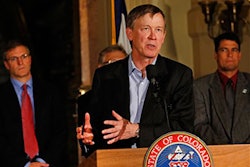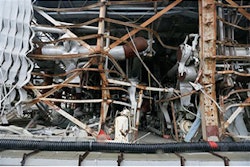SALT LAKE CITY (AP) — Another Utah refinery has received approval for a major expansion in a heavily populated corridor struggling to achieve federal air-quality standards, and a doctors' group pushing Utah to crack down harder on polluters says it will try to block Holly Refining & Marketing Co. in court.
Holly and state regulators say new controls will cut some emissions even as the refinery moves to increase capacity by 50 percent, to 60,000 barrels a day of Utah's crude oil.
The state issued Holly a new emissions permit late Monday.
"We'll have stricter requirements than any refinery in the state, and it took us two years to get the permit," Michael Astin, Holly's environmental manager, said Tuesday. "All we're doing is expanding our output."
Utah has five oil refineries, all located in the populated corridor north of Salt Lake City that doesn't meet federal air quality standards. Two of those refineries — Tesoro and Holly — are embarking on major expansions.
State regulators said they are requiring emission upgrades at all refineries as part of comprehensive plans to cut emissions.
Northern Utah has a unique pollution problem that brought 22 days of toxic air in January and February, as dormant weather systems trapped murky air inside bowl-shaped mountain basins. It was bad enough to prompt three rallies on Utah's Capitol Hill last winter. More recently, Utah earned "F'' grades from the American Lung Association. Tailpipe emissions account for more than half of Utah's pollution problem.
"It's a challenge for us having the refineries located here in the Salt Lake valley with us. When the inversion lid goes on, any large emissions will impact our air quality," said Bryce Bird, director of the Utah Division of Air Quality. "But it's not the only challenge we have. The vehicle miles we drive and the other sources overwhelm the industrial emissions."
To avoid Clean Air Act sanctions — the loss of highway funding — Utah is under pressure to show it can reduce emissions in the Salt Lake-Ogden region by 247 tons a day. That plan, repeatedly delayed in the past year, is now set for adoption by January, Bird said.
A group of doctors who have been sounding the air-pollution alarm for years say any refinery expansion only makes things worse. The state's worst air pollution episodes are bad enough to cause premature deaths in people with heart disease or trigger serious diseases, the Utah Physicians for a Healthy Environment said.
Brian Moench, an anesthesiologist and president of the group, said Tuesday they plan to seek an injunction.
Much of the added fuel produced in Utah will get piped to Las Vegas and southern California, he said.
"Holly shareholders will make literally billions, and all Utah families will get is decades of increased pollution," Moench said. "This makes a mockery of the state's supposed plan to clean up our air. While the state says they expect the citizens to voluntarily reduce their emissions, including changing their hair spray, the state has never turned down a single application from our largest polluters to expand and pollute more."
Holly ran computer models showing it would not exceed federal standards for any primary pollutant, even under the worst air-quality conditions, and by 2019, all Utah refineries will be required to stop flaring gas, Astin said.






















